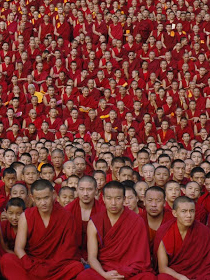- Home
- FPMT Homepage
Foundation for the Preservation of the Mahayana Tradition
The FPMT is an organization devoted to preserving and spreading Mahayana Buddhism worldwide by creating opportunities to listen, reflect, meditate, practice and actualize the unmistaken teachings of the Buddha and based on that experience spreading the Dharma to sentient beings. We provide integrated education through which people’s minds and hearts can be transformed into their highest potential for the benefit of others, inspired by an attitude of universal responsibility and service. We are committed to creating harmonious environments and helping all beings develop their full potential of infinite wisdom and compassion. Our organization is based on the Buddhist tradition of Lama Tsongkhapa of Tibet as taught to us by our founders Lama Thubten Yeshe and Lama Thubten Zopa Rinpoche.
- Willkommen
Die Stiftung zur Erhaltung der Mahayana Tradition (FPMT) ist eine Organisation, die sich weltweit für die Erhaltung und Verbreitung des Mahayana-Buddhismus einsetzt, indem sie Möglichkeiten schafft, den makellosen Lehren des Buddha zuzuhören, über sie zur reflektieren und zu meditieren und auf der Grundlage dieser Erfahrung das Dharma unter den Lebewesen zu verbreiten.
Wir bieten integrierte Schulungswege an, durch denen der Geist und das Herz der Menschen in ihr höchstes Potential verwandelt werden zum Wohl der anderen – inspiriert durch eine Haltung der universellen Verantwortung und dem Wunsch zu dienen. Wir haben uns verpflichtet, harmonische Umgebungen zu schaffen und allen Wesen zu helfen, ihr volles Potenzial unendlicher Weisheit und grenzenlosen Mitgefühls zu verwirklichen.
Unsere Organisation basiert auf der buddhistischen Tradition von Lama Tsongkhapa von Tibet, so wie sie uns von unseren Gründern Lama Thubten Yeshe und Lama Thubten Zopa Rinpoche gelehrt wird.
- Bienvenidos
La Fundación para la preservación de la tradición Mahayana (FPMT) es una organización que se dedica a preservar y difundir el budismo Mahayana en todo el mundo, creando oportunidades para escuchar, reflexionar, meditar, practicar y actualizar las enseñanzas inconfundibles de Buda y en base a esa experiencia difundir el Dharma a los seres.
Proporcionamos una educación integrada a través de la cual las mentes y los corazones de las personas se pueden transformar en su mayor potencial para el beneficio de los demás, inspirados por una actitud de responsabilidad y servicio universales. Estamos comprometidos a crear ambientes armoniosos y ayudar a todos los seres a desarrollar todo su potencial de infinita sabiduría y compasión.
Nuestra organización se basa en la tradición budista de Lama Tsongkhapa del Tíbet como nos lo enseñaron nuestros fundadores Lama Thubten Yeshe y Lama Zopa Rinpoche.
A continuación puede ver una lista de los centros y sus páginas web en su lengua preferida.
- Bienvenue
L’organisation de la FPMT a pour vocation la préservation et la diffusion du bouddhisme du mahayana dans le monde entier. Elle offre l’opportunité d’écouter, de réfléchir, de méditer, de pratiquer et de réaliser les enseignements excellents du Bouddha, pour ensuite transmettre le Dharma à tous les êtres. Nous proposons une formation intégrée grâce à laquelle le cœur et l’esprit de chacun peuvent accomplir leur potentiel le plus élevé pour le bien d’autrui, inspirés par le sens du service et une responsabilité universelle. Nous nous engageons à créer un environnement harmonieux et à aider tous les êtres à épanouir leur potentiel illimité de compassion et de sagesse. Notre organisation s’appuie sur la tradition guéloukpa de Lama Tsongkhapa du Tibet, telle qu’elle a été enseignée par nos fondateurs Lama Thoubtèn Yéshé et Lama Zopa Rinpoché.
Visitez le site de notre Editions Mahayana pour les traductions, conseils et nouvelles du Bureau international en français.
Voici une liste de centres et de leurs sites dans votre langue préférée
- Benvenuto
L’FPMT è un organizzazione il cui scopo è preservare e diffondere il Buddhismo Mahayana nel mondo, creando occasioni di ascolto, riflessione, meditazione e pratica dei perfetti insegnamenti del Buddha, al fine di attualizzare e diffondere il Dharma fra tutti gli esseri senzienti.
Offriamo un’educazione integrata, che può trasformare la mente e i cuori delle persone nel loro massimo potenziale, per il beneficio di tutti gli esseri, ispirati da un’attitudine di responsabilità universale e di servizio.
Il nostro obiettivo è quello di creare contesti armoniosi e aiutare tutti gli esseri a sviluppare in modo completo le proprie potenzialità di infinita saggezza e compassione.
La nostra organizzazione si basa sulla tradizione buddhista di Lama Tsongkhapa del Tibet, così come ci è stata insegnata dai nostri fondatori Lama Thubten Yeshe e Lama Zopa Rinpoche.
Di seguito potete trovare un elenco dei centri e dei loro siti nella lingua da voi prescelta.
- 欢迎 / 歡迎
简体中文
“护持大乘法脉基金会”( 英文简称:FPMT。全名:Foundation for the Preservation of the Mahayana Tradition) 是一个致力于护持和弘扬大乘佛法的国际佛教组织。我们提供听闻,思维,禅修,修行和实证佛陀无误教法的机会,以便让一切众生都能够享受佛法的指引和滋润。
我们全力创造和谐融洽的环境, 为人们提供解行并重的完整佛法教育,以便启发内在的环宇悲心及责任心,并开发内心所蕴藏的巨大潜能 — 无限的智慧与悲心 — 以便利益和服务一切有情。
FPMT的创办人是图腾耶喜喇嘛和喇嘛梭巴仁波切。我们所修习的是由两位上师所教导的,西藏喀巴大师的佛法传承。
繁體中文
護持大乘法脈基金會”( 英文簡稱:FPMT。全名:Found
ation for the Preservation of the Mahayana Tradition ) 是一個致力於護持和弘揚大乘佛法的國際佛教組織。我們提供聽聞, 思維,禪修,修行和實證佛陀無誤教法的機會,以便讓一切眾生都能 夠享受佛法的指引和滋潤。 我們全力創造和諧融洽的環境,
為人們提供解行並重的完整佛法教育,以便啟發內在的環宇悲心及責 任心,並開發內心所蘊藏的巨大潛能 — 無限的智慧與悲心 – – 以便利益和服務一切有情。 FPMT的創辦人是圖騰耶喜喇嘛和喇嘛梭巴仁波切。
我們所修習的是由兩位上師所教導的,西藏喀巴大師的佛法傳承。 察看道场信息:
- FPMT Homepage
- News/Media
-
- Study & Practice
-
-
- About FPMT Education Services
- Latest News
- Programs
- New to Buddhism?
- Buddhist Mind Science: Activating Your Potential
- Heart Advice for Death and Dying
- Discovering Buddhism
- Living in the Path
- Exploring Buddhism
- FPMT Basic Program
- FPMT Masters Program
- FPMT In-Depth Meditation Training
- Maitripa College
- Lotsawa Rinchen Zangpo Translator Program
- Universal Education for Compassion & Wisdom
- Online Learning Center
-
- Prayers & Practice Materials
- Overview of Prayers & Practices
- Full Catalogue of Prayers & Practice Materials
- Explore Popular Topics
- Benefiting Animals
- Chenrezig Resources
- Death & Dying Resources
- Lama Chopa (Guru Puja)
- Lama Zopa Rinpoche: Compendium of Precious Instructions
- Lama Zopa Rinpoche: Life Practice Advice
- Lama Zopa Rinpoche Practice Series
- Lamrim Resources
- Mantras
- Prayer Book Updates
- Purification Practices
- Sutras
- Thought Transformation (Lojong)
- Audio Materials
- Dharma Dates - Tibetan Calendar
- Translation Services
- Publishing Services
- Ways to Offer Support
- Prayers & Practice Materials
-
- Teachings and Advice
- Find Teachings and Advice
- Lama Zopa Rinpoche Advice Page
- Lama Zopa Rinpoche: Compendium of Precious Instructions
- Lama Zopa Rinpoche Video Teachings
- ༧སྐྱབས་རྗེ་བཟོད་པ་རིན་པོ་ཆེ་མཆོག་ནས་སྩལ་བའི་བཀའ་སློབ་བརྙན་འཕྲིན།
- Podcasts
- Lama Yeshe Wisdom Archive
- Buddhism FAQ
- Dharma for Young People
- Resources on Holy Objects
- Teachings and Advice
-
-
*If a menu item has a submenu clicking once will expand the menu clicking twice will open the page.
-
-
- Centers
-
- Teachers
-
- Projects
-
-
-
-
*If a menu item has a submenu clicking once will expand the menu clicking twice will open the page.
-
-
- FPMT
-
-
-
-
-
Superficial observation of the sense world might lead you to believe that people’s problems are different, but if you check more deeply, you will see that fundamentally, they are the same. What makes people’s problems appear unique is their different interpretation of their experiences.
Lama Thubten Yeshe
-
-
-
- Shop
-
-
-
The Foundation Store is FPMT’s online shop and features a vast selection of Buddhist study and practice materials written or recommended by our lineage gurus. These items include homestudy programs, prayers and practices in PDF or eBook format, materials for children, and other resources to support practitioners.
Items displayed in the shop are made available for Dharma practice and educational purposes, and never for the purpose of profiting from their sale. Please read FPMT Foundation Store Policy Regarding Dharma Items for more information.
-
-
Lama Zopa Rinpoche News and Advice
3
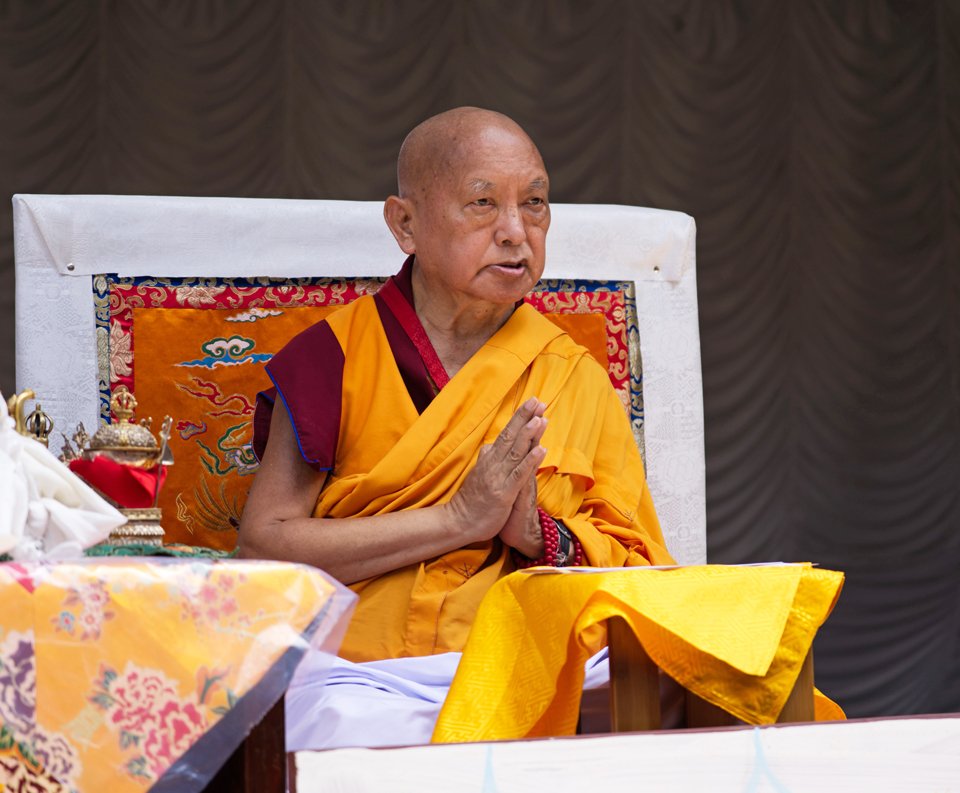
Lama Zopa Rinpoche during a fire puja, Kathmandu, Nepal, July 2020. Photo by Ven. Lobsang Sherab.
Lama Zopa Rinpoche made these comments in April 2014 after seeing images of the suffering of many people on television.
It’s important to use the situation to remind yourself how fortunate you are to still have a human body and a perfect human rebirth, which is most difficult to find, and that you have met the Buddhadharma and the virtuous friend.
Remind yourself how it’s most fortunate to still be a human being and not to waste it, and to practice the holy Dharma to purify and collect merit and actualize the path.
Use these kinds of situations to be inspired. The 270 people who died in the airplane accident, the sixteen Sherpas who died on Mount Everest, and so forth—use all these situations to remind yourself to practice Dharma and to generate compassion for those sentient beings and for all the suffering sentient beings.
This isn’t the first time [they have suffered and died like this]. They have experienced the suffering of pain, the suffering of change, and pervasive compounded suffering numberless times.
Then it’s helpful and becomes a meditation of the path of the lower, middle, and higher capable beings. Think of the suffering nature of samsara that has been experienced numberless times. This makes it useful when you hear that information and news.
This advice “Watching the News” was originally published in “Lama Zopa Rinpoche’s Online Advice Book” on the Lama Yeshe Wisdom Archive website:
https://lamayeshe.com/advice/watching-news
Watch the video series Lama Zopa Rinpoche’s Teachings on Thought Transformation during the Time of COVID-19 and find links to videos in translation, transcripts, MP3s, additional practice advice, and more:
https://fpmt.org/fpmt/announcements/resources-for-coronavirus-pandemic/advice-from-lama-zopa-rinpoche-for-coronavirus/
Lama Zopa Rinpoche is the spiritual director of the Foundation for the Preservation of Mahayana Tradition (FPMT), a Tibetan Buddhist organization dedicated to the transmission of the Mahayana Buddhist tradition and values worldwide through teaching, meditation and community service.
- Tagged: advice from lama zopa rinpoche
30
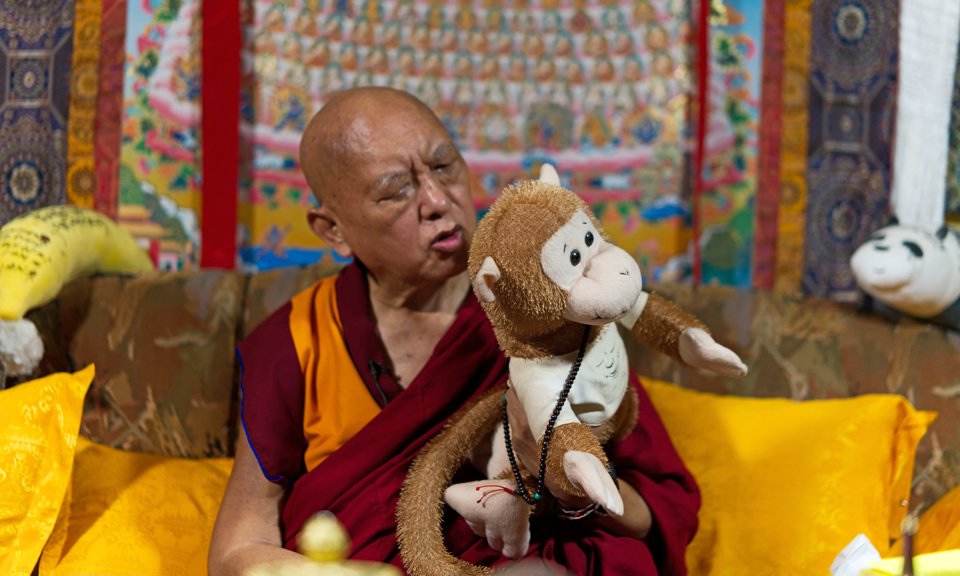
Lama Zopa Rinpoche reciting mantras and making prayers on stuffed toys before giving them away. The mantras recited on them bless anyone who then sees or touches them, Kopan Monastery, June 2020. Photo by Ven. Lobsang Sherab.
Lama Zopa Rinpoche continues his video teachings on thought transformation from Kopan Monastery in Nepal. Here is a summary of the most recent teaching:
Rinpoche begins this teaching explaining that keeping morality is the basis for practicing lojong (thought transformation). The habit for negative karma causes us to suffer in samsara continuously. By practicing the lamrim, with morality as the basis, you develop the inspiration and energy to stop your habit of non-virtue. Instead of becoming habituated toward negative karma, you develop the habit of living your life with bodhichitta and the awareness of emptiness. Everything we see, whatever appears, is a total hallucination based on the habits of our mind. So if possible, we should get into the habit of meditating on emptiness no matter what we are doing. And by developing the habit of bodhichitta, the good heart—wow—this is like making life into a diamond.
In this life we are responsible for our future lives’ happiness and suffering. To eliminate the suffering of future lives we have to stop running toward whatever we think is the best pleasure and following desire without thinking of future happiness or enlightenment. Samsaric pleasures are like a cheating cannibal. At first you completely trust them, think they are very sweet and kind to you, but then after some time they eat you.
To generate real bodhichitta, first you need to have strong renunciation. You need to see sentient beings’ suffering as if you fell into a red-hot fire. And before that, you have to have strong renunciation in your own samsara. With full renunciation of the three kinds of suffering (suffering of pain, suffering of change, and pervasive compounding suffering) comes great compassion for the suffering of others. The more compassion and bodhichitta you have, the happier you are to take responsibility for freeing others from the oceans of samsaric suffering by bringing them to enlightenment.
It is important to continuously have determination to practice your vows correctly and to learn at least the essence of the vows. Even if you don’t learn an extensive explanation of the vows, if you have the essence, then mistakes are not as likely to happen. In order to protect yourself, you have to have a plan for what to do after you ordain. You have to have somebody teaching you and guiding you. One of the purposes of reciting Six-Session Guru Yoga is to go over the vows you have taken.
There are many purification practices one can engage in to purify negative karma created: self-initiation, prostrations to the Thirty-Five Buddhas, Vajrasattva practice, tsog offering, and reciting mantras. You also need to know the four doors for creating downfalls (breaking vows): lack of conscientiousness, lack of respect, not understanding the vow, and having many delusions. Even if you don’t know the vows extensively, understanding the essence is very important.
We invite you to go deeper into the topics presented here, plus many others, by watching Rinpoche’s video and reading the full transcript of Rinpoche’s teaching.
Watch Lama Zopa Rinpoche’s teaching “The Benefits of Keeping Vows and the Shortcomings of Degenerating Them”:
https://youtu.be/rqX2BuhPu0k
- Read the transcript of Rinpoche’s teaching
- Dedication verses for COVID-19 Crisis Teachings
- You can find practices mentioned by Rinpoche in the FPMT Foundation Store
- For more on mantras, see our Mantras resource page
Watch more from the video series Lama Zopa Rinpoche’s Teachings on Thought Transformation during the Time of COVID-19 and find links to videos in translation, transcripts, MP3s, additional practice advice, and more:
https://fpmt.org/fpmt/announcements/resources-for-coronavirus-pandemic/advice-from-lama-zopa-rinpoche-for-coronavirus/
Practice advice from our teachers, Dharma study-from-home opportunities, and more can be found on the page “Resources for the Coronavirus Pandemic.”
Lama Zopa Rinpoche is the spiritual director of the Foundation for the Preservation of Mahayana Tradition (FPMT), a Tibetan Buddhist organization dedicated to the transmission of the Mahayana Buddhist tradition and values worldwide through teaching, meditation and community service.
- Tagged: advice from lama zopa rinpoche, coronavirus, covid-19, lama zopa rinpoche thought transformation video teaching, video, vows
29
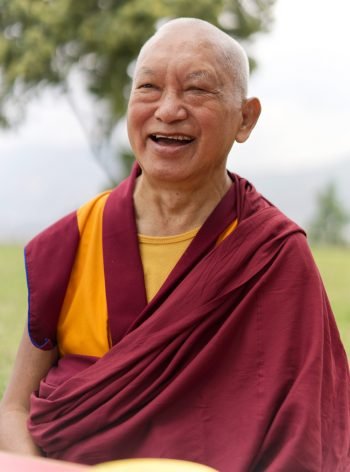
Lama Zopa Rinpoche on top of Kopan Hill, Kopan Monastery, Nepal, May 2020. Photo by Ven. Lobsang Sherab.
Lama Zopa Rinpoche continues his video teachings on thought transformation from Kopan Monastery in Nepal. Here is a summary of the most recent teaching:
This teaching was offered on Chokhor Duchen (July 24), which is one of the holy days of Guru Shakyamuni Buddha, when the power of any meritorious action is multiplied 100 million times. Chokhor Duchen commemorates the anniversary of Shakyamuni Buddha’s first teaching after showing the aspect of attaining enlightenment.
Lama Zopa Rinpoche begins this teaching discussing the twelve deeds done by Shakyamuni Buddha, which reveal why we need to practice Dharma.
Shakyamuni Buddha gave three turnings of the wheel of Dharma: the four noble truth teachings in Sarnath; the Prajnaparamita teachings in Rajgir; and the Chittamatra view. On wheel-turning days, because merit is multiplied by 100 million, Rinpoche is asking us to “wake up” and not waste the opportunity by being distracted by worldly pleasures and worldly concerns. For example, writing sutras in gold ink is a way to collect skies of merit.
Rinpoche shares more about the benefits of the Sutra of Great Liberation, including that if you read it just before you die you are immediately rescued from the lower realms. Rinpoche continues offering the oral transmission of this powerful sutra.
We invite you to go deeper into the topics presented here, plus many others, by watching Rinpoche’s video and reading the full transcript of Rinpoche’s teaching.
Watch Lama Zopa Rinpoche’s teaching “Wake Up—Don’t Waste the Four Holy Days of Guru Shakyamuni Buddha“:
https://youtu.be/N5hncWNKtn8
- Read the transcript of Rinpoche’s teaching
- For more on the four holy days of Guru Shakyamuni Buddha, see Practice on Merit Multiplying Days and Eclipses
- Dedication verses for COVID-19 Crisis Teachings
Watch more from the video series Lama Zopa Rinpoche’s Teachings on Thought Transformation during the Time of COVID-19 and find links to videos in translation, transcripts, MP3s, additional practice advice, and more:
https://fpmt.org/fpmt/announcements/resources-for-coronavirus-pandemic/advice-from-lama-zopa-rinpoche-for-coronavirus/
Practice advice from our teachers, Dharma study-from-home opportunities, and more can be found on the page “Resources for the Coronavirus Pandemic.”
Lama Zopa Rinpoche is the spiritual director of the Foundation for the Preservation of Mahayana Tradition (FPMT), a Tibetan Buddhist organization dedicated to the transmission of the Mahayana Buddhist tradition and values worldwide through teaching, meditation and community service.
- Tagged: advice from lama zopa rinpoche, buddha day, coronavirus, covid-19, lama zopa rinpoche thought transformation video teaching, merit multiplying day, oral transmission, sutra of great liberation, video
28
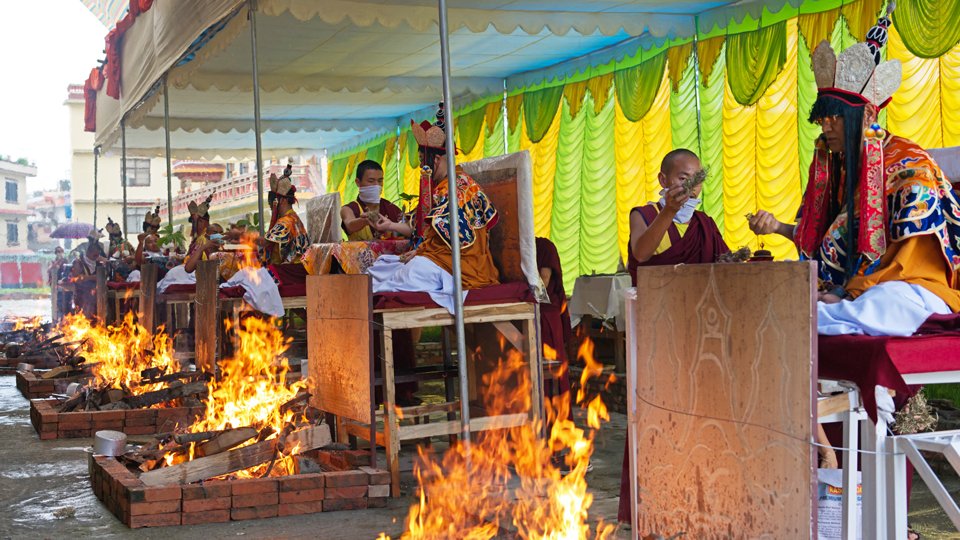
Khadro-la; Tsoknyi Rinpoche; Mingyur Rinpoche; Lama Zopa Rinpoche; the Abbot of Shechen Monastery, Yeshe Gyaltsan; the Abbot of Mindroling Monastery, Theckchok Gyaltsan; and Kopan Monastery abbot Khen Rinpoche Geshe Chonyi offering fire pujas. These fire pujas are for all beings and the current world situation, for healing and purifying obstacles, Kopan Nunnery, Nepal, July 2020. Photo by Ven. Lobsang Sherab.
More than forty fire pujas are being done in Nepal to purify and heal the coronavirus pandemic situation and its negative impact in Nepal and around the world.
Based on advice from Rangjung Neljorma Khadro Namsel Drönme (Khadro-la), several high lamas and abbots in Nepal are participating in the fire pujas, which began earlier in the month. The fire pujas, which require extensive preparations, are being done in different locations in Kathmandu.
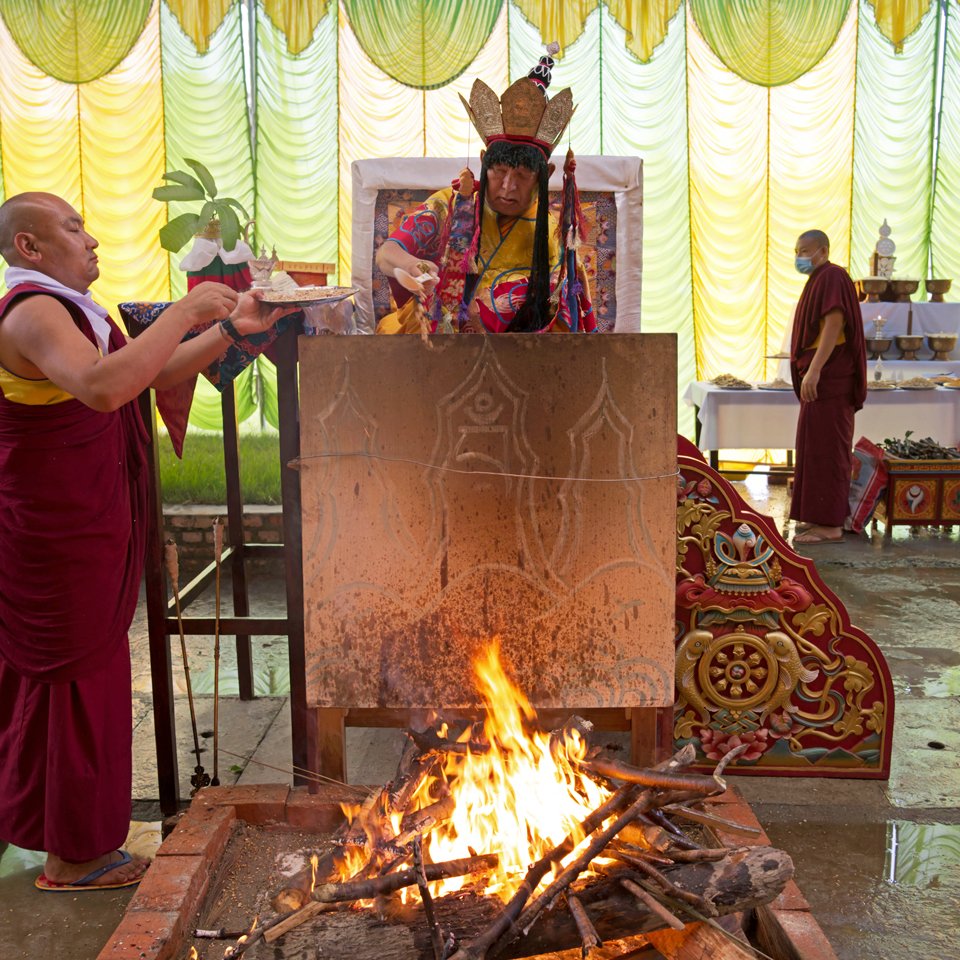
Lama Zopa Rinpoche during a fire puja held at Kopan Nunnery, Nepal, July 2020. Photo by Ven. Lobsang Sherab.
In a message written on Chokhor Duchen (July 24), Khadro-la explains the purpose of the ritual practices as well as all the practices she has initiated. After acknowledging the supreme importance of the teachings of Shakyamuni Buddha and His Holiness the Dalai Lama, she writes:
“In these most decadent of times, the world we live in has become a frightening place. It is if we are being held between the very fangs of the lord of death himself. As such, it is correct to petition the three Rare and Sublime Ones to send forth a downpour of cooling nectar to, extinguish, pacify, and thoroughly wash away the raging fires of the COVID-19 pandemic. Similarly, may improper action and thought, that which serves to belittle and harm others, saber rattling, the readying of weapons, and all forms of warfare be naturally pacified. May virtue increase and be completed in a perfect and timely way and may the sun of truth never set on the plight of the Tibetan people.
“In essence, may the mistaking of appearances, the clouds of grasping at independent existence, co-emergent ignorance, which shower such suffering, be completely blown away, allowing the naturally bright sun—the natural and spontaneously present wisdom, a natural state of emptiness and awareness conjoined which is arisen in of itself and abides inherently awake and self-liberated. It is the primordial nature, the basic-space of the ground that pervades all beings—to rise without impediment in a bright and clear sky; it’s natural and brilliant knowledge and wisdom radiating outwardly as the illumination of the unmistaken mutual dependence of things.
“I considered that if the causes were correctly assembled, the ensuing result would prove meaningful.”
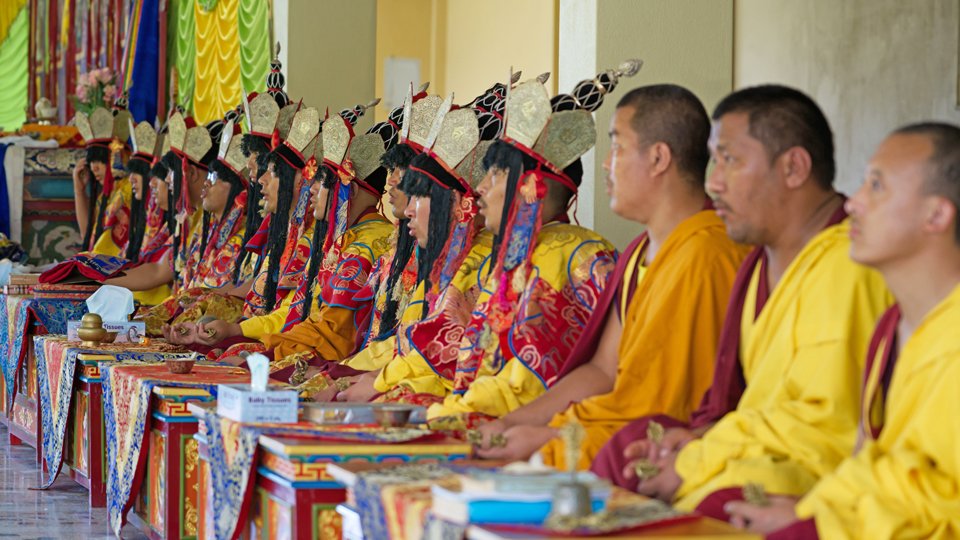
The tantric college monks and other monks offering prayers, while Khadro-la, Tsoknyi Rinpoche, Mingyur Rinpoche, Lama Zopa Rinpoche, the Abbot of Shechen Monastery, the Abbot of Mindroling Monastery, and Khen Rinpoche Geshe Chonyi offer the fire pujas, Kopan Nunnery, Nepal, July 2020. Photo by Ven. Lobsang Sherab.
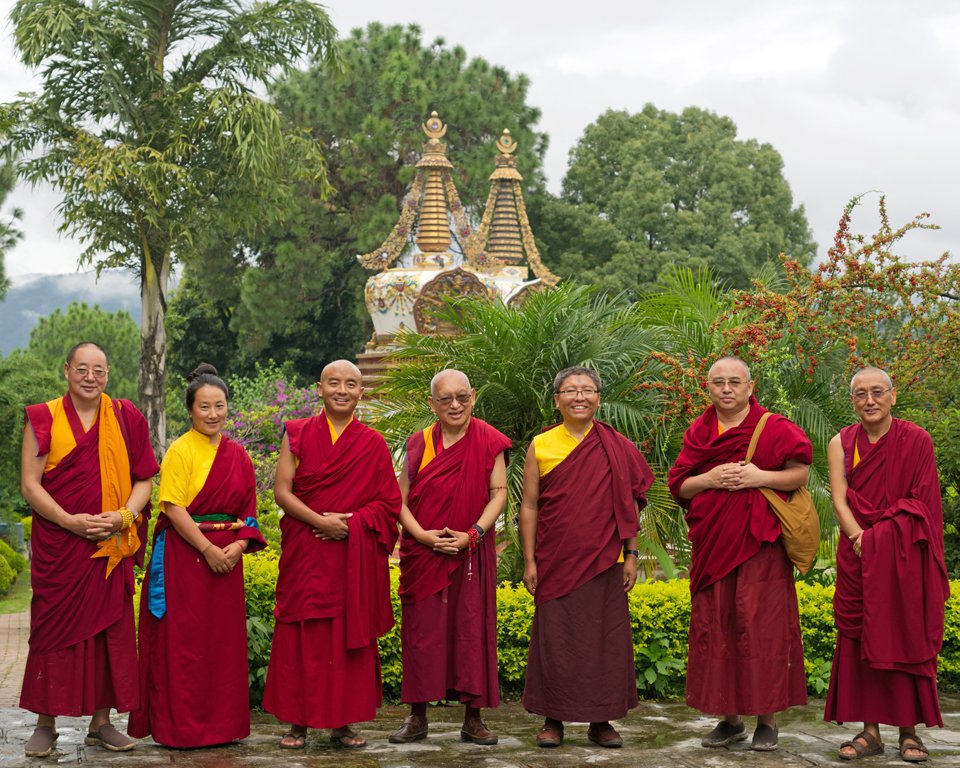
(From left) The Abbot of Shechen Monastery, Khadro-la, Mingyur Rinpoche, Lama Zopa Rinpoche, Tsoknyi Rinpoche, the Abbot of Mindroling Monastery, and Khen Rinpoche Geshe Chonyi in the gardens at Kopan Monastery, Nepal, July 2020. Photo by Ven. Lobsang Sherab.
The core group of lamas participating in the fire pujas are Khadro-la; Tsoknyi Rinpoche; Mingyur Rinpoche; Lama Zopa Rinpoche; the Abbot of Shechen Monastery, Yeshe Gyaltsan; and the Abbot of Mindroling Monastery, Theckchok Gyaltsan. They have been joined by Osel Dorje Rinpoche, Kopan Monastery abbot Khen Rinpoche Geshe Chonyi, and other geshes, depending on the day and location.
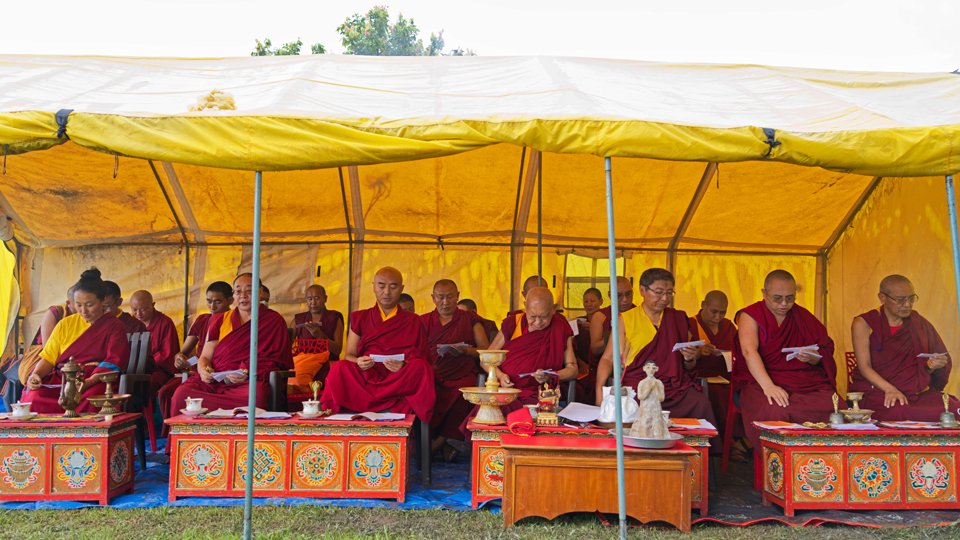
(From left) Khadro-la, the Abbot of Shechen Monastery, Mingyur Rinpoche, Lama Zopa Rinpoche, Tsoknyi Rinpoche, the Abbot of Mindroling Monastery, and Khen Rinpoche Geshe Chonyi doing an incense puja at Kopan Monastery, Nepal, July 2020. Photo by Ven. Lobsang Sherab.
The fire pujas are often accompanied by an incense puja, such as Padmasambhava incense puja or incense puja for the four directions. In total, seven sets of fire pujas will be completed by the six core lamas in the coming weeks.
Please enjoy this inspiring video of scenes from a fire puja at Kopan Nunnery:
https://youtu.be/HAJ6OtrY4Yo
PLease enjoy this inspiring video of scenes from an incense puja at Kopan Monastery:
https://youtu.be/gcXVLpiHJHE
Watch more from the video series Lama Zopa Rinpoche’s Teachings on Thought Transformation during the Time of COVID-19 and find links to videos in translation, transcripts, MP3s, additional practice advice, and more:
https://fpmt.org/fpmt/announcements/resources-for-coronavirus-pandemic/advice-from-lama-zopa-rinpoche-for-coronavirus/
Practice advice from our teachers, Dharma study-from-home opportunities, and more can be found on the page “Resources for the Coronavirus Pandemic.”
Lama Zopa Rinpoche is the spiritual director of the Foundation for the Preservation of Mahayana Tradition (FPMT), a Tibetan Buddhist organization dedicated to the transmission of the Mahayana Buddhist tradition and values worldwide through teaching, meditation and community service.
- Tagged: coronavirus, covid-19, fire puja, khandro kunga bhuma, lama zopa rinpoche, tsoknyi rinpoche, yongey mingyur rinpoche
27
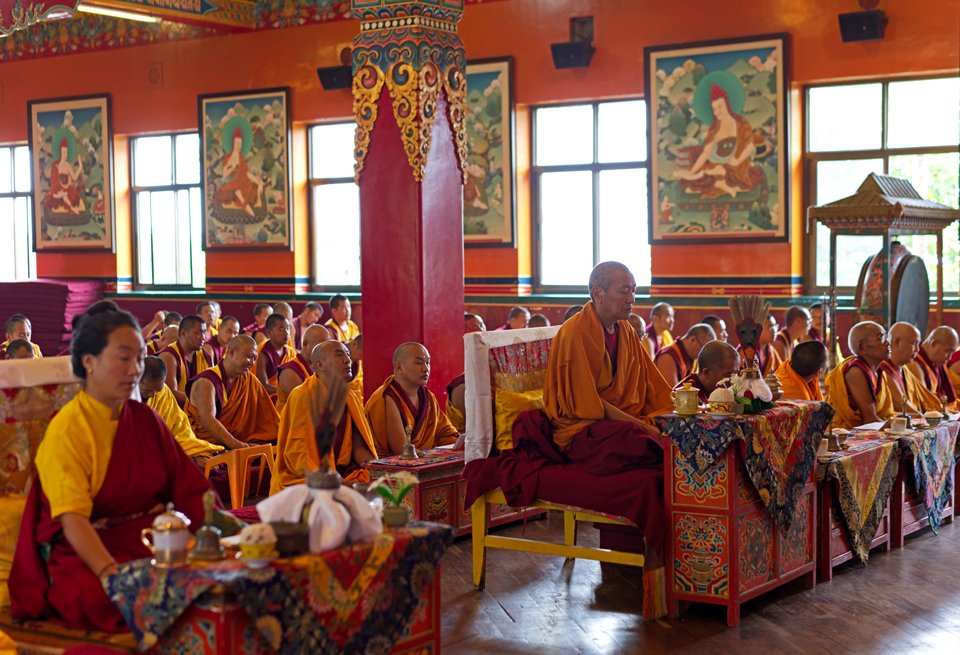
The third day of preparations for a special long life puja offered to Lama Zopa Rinpoche. Khadro-la, Khen Rinpoche Geshe Chonyi, and about 100 senior monks are doing the preparations, Kopan Monastery, July 2020. Photo by Ven. Lobsang Sherab.
Lama Zopa Rinpoche continues his video teachings on thought transformation from Kopan Monastery in Nepal. Here is a summary of the most recent teaching:
Lama Zopa Rinpoche begins this teaching reminding us that the real purpose of life is to free the numberless sentient beings from oceans of samsaric sufferings and bring them to enlightenment. To do that perfectly, one needs to achieve the state of omniscience, the state of perfect power to reveal the methods, and the state of complete compassion for every single sentient being. The buddhas and bodhisattvas have a hundred-thousand times more compassion for sentient beings than we have for ourselves. Since they have hundreds of thousands of times more compassion for all sentient beings than they cherish themselves—how dare we harm anyone? How can we say negative words and do harmful actions of the body, speech, and mind? Buddhas and bodhisattvas have so much concern for others that when you harm them it is like harming numberless buddhas and bodhisattvas. You are doing what they dislike. Likewise, benefiting sentient beings is the best offering to buddhas and bodhisattvas because it pleases them.
You are cheating yourself by thinking of “me, me, me” and working only for yourself because all happiness comes from sentient beings, and also Buddha, Dharma, and Sangha come from sentient beings. Because ordinary beings haven’t realized emptiness, everything appears to be truly existing by itself, existing from its own side, real. A buddha doesn’t have that. For a buddha things appear as if they are merely imputed by the mind. When we examine attachment, whatever we think is beautiful and get attached to, we think this came from its own side, but it came from our mind. We projected it. It is one thing to recognize our attachment, but we actually need to control it.
Rinpoche offered advice to FPMT’s ordained Sangha in the second part of this teaching. First, Rinpoche suggests that they should spend one, two, or three months in a monastery or nunnery, protecting themselves in a monastic setting and doing things such as sojong practice, purifying, and reviving. FPMT monks and nuns become so busy teaching, working, traveling, and working for centers and the organization that it becomes difficult to live a humble life. Rinpoche also advises that FPMT Sangha should study and meditate on the lamrim every day and read Dharma texts mindfully as an analytical meditation. If you don’t meditate on lamrim, you become undisciplined and unable to keep your vows. No matter how busy you are, meditate on the lamrim for an hour, half hour, 15 minutes, whatever one can manage. Read one lamrim text as the main essence of the whole teachings, maybe three or five times from beginning to end. If there is something you don’t know, you can write it down and ask someone who can help; and if you don’t know Tibetan, you have to depend on a translator.
Rinpoche continues his advice to FPMT Sangha explaining that they should do effortful meditation on each section of the lamrim for several months. After that, do effortless meditation for as long as it takes for the realization that the guru is a buddha. Then you will be most happy to follow the guru’s advice and wishes. Being free from samsara and achieving enlightenment depends on this and is the root of the path to enlightenment. It is easy to have lamrim realizations when you have strong devotion—great or small realizations depends on whether you have great or small devotion. Looking at the qualities of the guru, and not focusing on their mistakes, seeing whatever the guru does as positive, is the most important practice. In the view of the hallucinated mind, our own mistakes appear in the guru’s actions.
Be careful: don’t get ordained without someone to guide you. Without a monastery or nunnery to guide you on the path, on how to protect the vows, many can’t find meaning and disrobe. For those who become ordained Sangha, Rinpoche is offering advice on how to protect the vows.
We invite you to go deeper into the topics presented here, plus many others, by watching Rinpoche’s video and reading the full transcript of Rinpoche’s teaching.
Watch Lama Zopa Rinpoche’s teaching “How Sangha Can Protect Themselves”:
https://youtu.be/zUE3aEUI3h4
- Read the transcript of Rinpoche’s teaching
- More information on the monks and nuns of FPMT
- Dedication verses for COVID-19 Crisis Teachings
Watch more from the video series Lama Zopa Rinpoche’s Teachings on Thought Transformation during the Time of COVID-19 and find links to videos in translation, transcripts, MP3s, additional practice advice, and more:
https://fpmt.org/fpmt/announcements/resources-for-coronavirus-pandemic/advice-from-lama-zopa-rinpoche-for-coronavirus/
Practice advice from our teachers, Dharma study-from-home opportunities, and more can be found on the page “Resources for the Coronavirus Pandemic.”
Lama Zopa Rinpoche is the spiritual director of the Foundation for the Preservation of Mahayana Tradition (FPMT), a Tibetan Buddhist organization dedicated to the transmission of the Mahayana Buddhist tradition and values worldwide through teaching, meditation and community service.
- Tagged: advice from lama zopa rinpoche, coronavirus, covid-19, international mahayana institute, lama zopa rinpoche advice for sangha, lama zopa rinpoche thought transformation video teaching, sangha, video
24
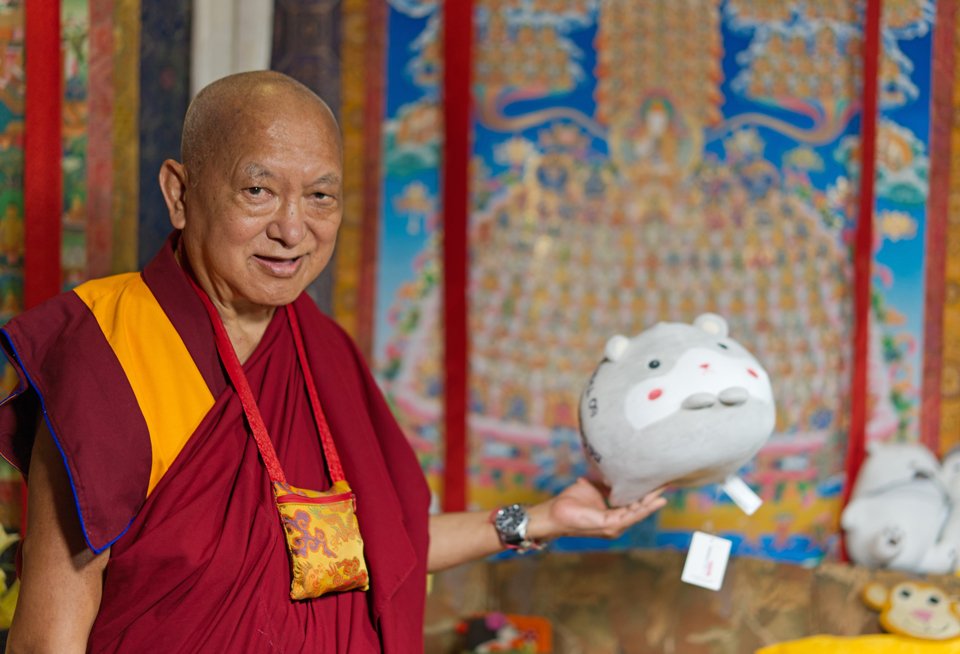
Lama Zopa Rinpoche explaining the Dharma message he’d written on the stuffed toy, Kopan Monastery, Nepal, July 2020. Photo by Ven. Lobsang Sherab.
Lama Zopa Rinpoche continues his video teachings on thought transformation from Kopan Monastery in Nepal. Here is a summary of the most recent teaching:
Lama Zopa Rinpoche beings this teaching explaining that the foundation of lojong (thought transformation) is not only for utilizing suffering on the path to enlightenment for every single sentient being. If you have happiness, you also dedicate it to sentient beings, to bring them to enlightenment. In this way, whatever happiness you experience is for others. Enemy, friend, stranger—everyone is included here.
When a mosquito is buzzing around you, or someone harms you, you can see whether or not you are really practicing Dharma. No matter how many mantras or prayers you recite, how many retreats you have done, at the time when someone is angry, scolding, or disrespecting you—if your mind is kind and compassionate and you generate patience or forgiveness, or if you get angry and want to kill or crush them (in the case of the mosquito)—you can see whether or not you are practicing Dharma by how much you can dedicate for sentient beings.
Obstacles, disturbing situations, undesirable conditions—all persuade you to practice virtue. You need to complete the paramita of patience to achieve enlightenment. Someone who is angry with you is the practical teacher of patience, a practical guru of patience. Only the person you call “enemy” makes you practice the paramita of patience and puts into practice the teachings you have received. The person you call “enemy” gives you enlightenment.
If you don’t want to be reborn in hell, you have to be careful not to get angry. If you get angry because your present situation disturbs the mind or is unpleasant—why not use logic to stop the anger, which is the cause of the hell realm? If you don’t like the suffering of your unpleasant situation, it is not logical to get angry and create the cause of hell, which is even a heavier suffering. Remembering that people make mistakes out of ignorance gives you an opportunity to generate compassion for them. Their mistake is their delusion, not the person. When our minds are overwhelmed by delusion, our lives becomes so crazy. This is a practical method for bringing peace in the world, to see it this way.
Taking others’ suffering on yourself when you are suffering is like transforming “kaka” into gold. If you cherish others, there is no space in your heart for depression, and you can rejoice all the time while doing normal daily activities.
By becoming habituated to non-virtue, we do non-virtuous actions again and again. Even if we know an action is harmful, we can’t stop from doing it. Even if someone has met the Dharma and thinks Dharma is good, they can’t practice because the mind is so habituated with killing, stealing, telling lies, etc. Even if you receive teachings from great lamas who have all the qualities to reveal the path and are so rare to find in the world, you will not have any realizations because of the habituation of negative karma.
If you are reborn as an animal due to negative karma, what can you do? You have to eat or be eaten by others. The tiny amount of blood eaten by a mosquito is nothing compared to what you have done numberless times. When you hear that mosquito buzzing it means it is suffering, it needs something. When you suffer, you complain to others. It is similar to what the mosquito is doing.
Developing the habit of engaging in non-virtue is very scary. We should develop the habit of engaging in virtue such as perfectly following the guru, renunciation, bodhichitta, and right view. We should be habituated in the six paramitas, including patience. By becoming habituated to the practice of patience, we can practice it more and more. Those who don’t practice patience easily become angry and destroy everything. All the virtues you worked so hard for and the merit you created can be destroyed if you don’t practice patience. By thinking of cause and effect, you can stop ignorance. A childish mind is easily made happy and unhappy.
By following attachment, anger, and ignorance you can end up in the lower realms, losing your precious human rebirth.
In all situations, first you discriminate “bad” and “good,” and then from that anger and attachment arise. Everything is projected. You become attached to something that your mind created. So the point is that there is nothing to be attached to.
We invite you to go deeper into the topics presented here, plus many others, by watching Rinpoche’s video and reading the full transcript of Rinpoche’s teaching.
Watch Lama Zopa Rinpoche’s teaching “Attachment Causes You to Lose Your Precious Human Life“:
https://youtu.be/sDEuOiwD1tI
Watch more from the video series Lama Zopa Rinpoche’s Teachings on Thought Transformation during the Time of COVID-19 and find links to videos in translation, transcripts, MP3s, additional practice advice, and more:
https://fpmt.org/fpmt/announcements/resources-for-coronavirus-pandemic/advice-from-lama-zopa-rinpoche-for-coronavirus/
Practice advice from our teachers, Dharma study-from-home opportunities, and more can be found on the page “Resources for the Coronavirus Pandemic.”
Lama Zopa Rinpoche is the spiritual director of the Foundation for the Preservation of Mahayana Tradition (FPMT), a Tibetan Buddhist organization dedicated to the transmission of the Mahayana Buddhist tradition and values worldwide through teaching, meditation and community service.
- Tagged: advice from lama zopa rinpoche, coronavirus, covid-19, lama zopa rinpoche thought transformation video teaching, video
23
Meditate on Emptiness Every Day
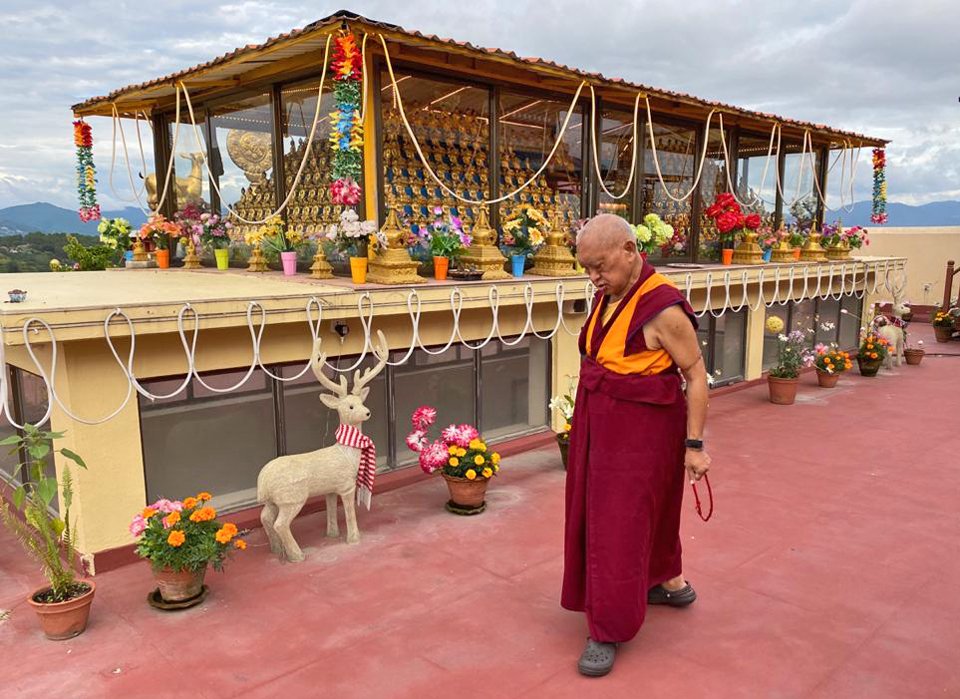
Lama Zopa Rinpoche circumambulating the 1,000 buddhas at Kopan Monastery, Nepal, June 2020. Photo by Ven. Roger Kunsang.
The Six Perfections: The Practice of the Bodhisattvas is a recent book from Lama Zopa Rinpoche. In it, Rinpoche walks us through this key Mahayana Buddhist teaching. Here’s an excerpt from Rinpoche’s teaching on the perfection of wisdom:
We have this ignorance, this wrong concept, believing in the real I and the real aggregates, which are, in fact, totally empty, which have never existed in the past, from beginningless rebirths. This false concept brings so many problems, causing us to be forever worried about when this I can be happy—this real I that our ignorance believes in and that has never existed. When can it be happy?
All our life we worry about this, through kindergarten, primary school, high school, and college. We go to university and get a degree so this real I can be happy. We get a job and earn a good salary so this real I can be happy. We marry and have children just for this real I. We feel once we have achieved all these goals, then this real I will be so happy!
Our whole life is spent afraid of something happening to this I, to this real I. We totally—100 percent—believe in its reality, and we do everything possible to protect this real I, which is not there. We are filled with apprehension about what will harm us: “This will make me sick. This will kill me. This will hurt me.” We take every possible precaution to prevent this real I that doesn’t exist from being hurt.
Determined to keep fit, we do hours of exercise every day, by jogging or working out on machines. There is a big industry making new types of machines for our supposedly real I to keep fit on. As soon as a machine has been on the market a few months, a new one comes out and our I has to have it. Each machine makes us do it differently—from lying upside down to putting our head between our legs—and we are forced to buy new ones because the experts in advertisements convince us this new one is better. We have injections to prevent diseases before they happen and take all sorts of vitamins every day. This is all done to protect this I that appears real and that we believe in 100 percent.
Because we believe in this supposedly real I, we get angry when somebody cheats us, lies to us, steals from us, blames us, and so forth. We get angry for this real I. We sue that person, bringing a court case against them, spending thousands—even millions!—of dollars all for this real I to harm and defeat its enemy and so be happy. For the real I to be happy we want to put that person into prison. Every day people hurt and even kill others for this real I that does not exist at all, creating all this negative karma for something that is a total hallucination.
Just as a dictator, cheated by this wrong concept of a real I, can start wars and kill millions of people, we are cheated in the same way. Therefore it is vital that we end this tyranny of the real I now. From beginningless rebirths we have been experiencing the sufferings of the hell beings, the hungry ghosts, the animals, the human beings, the gods, the demigods, and the intermediate-state beings. As human beings we have the suffering of rebirth, old age, sickness, and death; the suffering of meeting undesirable objects and not meeting desirable objects. Even if we manage to get what we want, we are still unable to find satisfaction, which is the greatest problem of affluent humans and gods. No matter how many desirable objects we manage to acquire, we can never find satisfaction, but we try and try and try.
This is not the first time we have been like this, with all these sufferings. This has been our experience for countless lifetimes. If we fail to do something now, while we have the opportunity to realize emptiness, we will suffer endlessly in samsara.
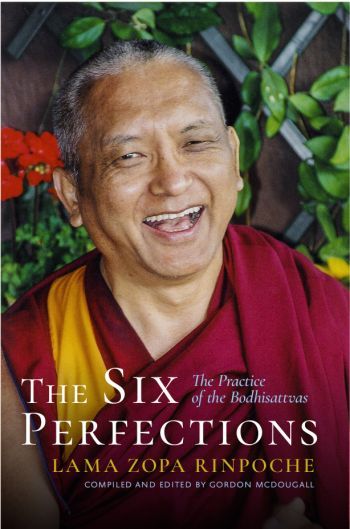
Cover of Lama Zopa Rinpoche’s book The Six Perfections
All phenomena are empty; they do not exist from their own side, especially I, the body, the aggregates, and the possessions—the objects of our attachment and anger. To remind ourselves of the vital subjects of impermanence, emptiness, and dependent arising, it is very worthwhile to constantly reflect on the meaning of the verse from the Vajra Cutter Sutra, seeing everything as like a star, a mirage, or an illusion.
If we can meditate on this every day, even though we might be far from attaining realizations, having a degree of familiarity will help very much, creating so much peace and happiness in our life. Then we will be able to practice the Dharma more and more, and gain more and more freedom for ourselves until we are able to attain a blissful state of peace, liberation from samsara, and then enlightenment.
Learn more about The Six Perfections: The Practice of the Bodhisattvas, including order information, on Wisdom Publication’s website:
https://wisdomexperience.org/product/the-six-perfections/
Watch the video series Lama Zopa Rinpoche’s Teachings on Thought Transformation during the Time of COVID-19 and find links to videos in translation, transcripts, MP3s, additional practice advice, and more:
https://fpmt.org/fpmt/announcements/resources-for-coronavirus-pandemic/advice-from-lama-zopa-rinpoche-for-coronavirus/
Lama Zopa Rinpoche is the spiritual director of the Foundation for the Preservation of Mahayana Tradition (FPMT), a Tibetan Buddhist organization dedicated to the transmission of the Mahayana Buddhist tradition and values worldwide through teaching, meditation and community service.
22
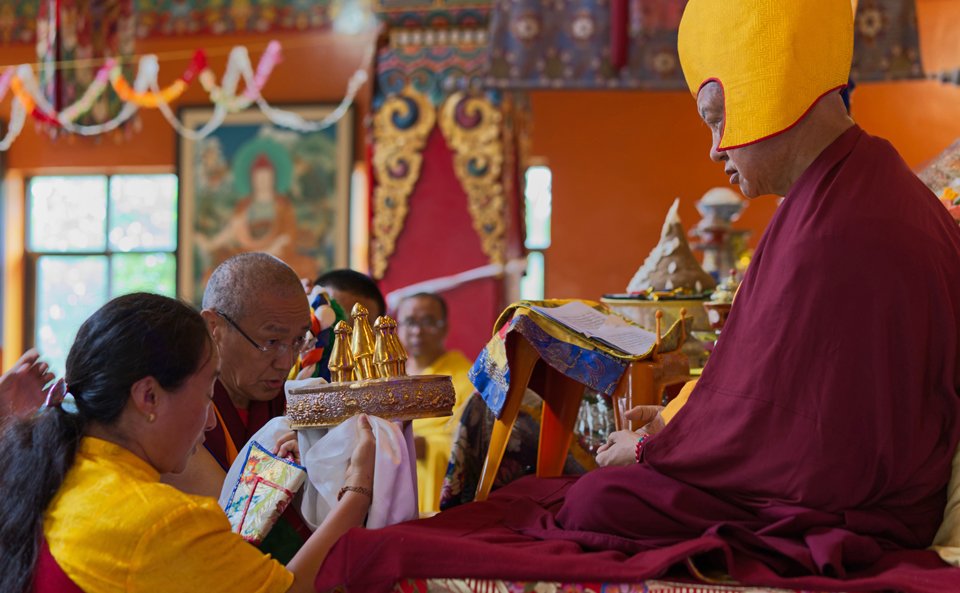
Khadro-la and Khen Rinpoche Geshe Chonyi offering Lama Zopa Rinpoche a mandala during a special White Tara long life puja offered to Rinpoche, Kopan Monastery, July 2020. Photo by Ven. Lobsang Sherab.
Lama Zopa Rinpoche continues his video teachings on thought transformation from Kopan Monastery in Nepal. Here is a summary of the most recent teaching:
Lama Zopa Rinpoche begins this teaching by continuing to discuss vows. Rinpoche explains that lay people can take the refuge vow alone or with some or all of the lay vows.
Since even some animals can be trained to do things, this should inspire human beings to train their minds to do better and actualize the lamrim.
Life is short and this precious human life should not be wasted and thrown away like used tissue paper. Many things in the world are done for attachment instead of learning Dharma. If you learned Dharma but didn’t practice or do retreat, when your life ends, you will not have used your opportunity to purify your negative karma collected since beginningless rebirths. Then life is wasted due to the distraction of being a slave to attachment, anger, and jealousy. Many times, even if we know a lot, we don’t have realizations so we don’t get a chance to change our minds.
That, by making you habituated and acquainted with always engaging in nonvirtue, again you will depend on nonvirtue, engage in nonvirtue, and be reborn following nonvirtue.
By habituating and acquainting yourself with engaging in non-virtue (negative karma), you depend on non-virtue, and will be reborn in non-virtue. His Holiness used the term, “hygiene of emotions” to describe the act of controlling the mind and practicing loving-kindness, compassion, patience, and satisfaction so one doesn’t ruin their immune system with anger. A rough, violent mind eats at the immune system, and then you have no protection against disease, and it is easy to get sick and die. You have to wake up from the sleep of ignorance and defeat the delusions. Every time you follow attachment you are putting yourself in the prison of samsara. It makes life so difficult again and again. Because of habituation, you create negative karma even though you know it is not good.
You can take animals around holy objects. Even though you think you are helping the animal, the animal is also helping you create the cause for enlightenment. Going around holy objects containing the four Dharmakaya Relic Mantras purifies so much negative karma, you don’t have to worry about death.
In a pure land, there is no true suffering because the nature of a pure land is not caused by karma and delusions. Pure lands happen because of the power of prayer and the roots of merit. Living beings in a pure land do not experience true sufferings. All the places in a pure land are free of true suffering. It is important to know how to be reborn in a pure land. Even ordinary beings can easily create the cause to be reborn in Amitabha Pure Land.
We invite you to go deeper into the topics presented here, plus many others, by watching Rinpoche’s video and reading the full transcript of Rinpoche’s teaching.
Watch Lama Zopa Rinpoche’s teaching “By Habituating Yourself with Negative Karma, You Do It Again and Again”:
https://youtu.be/4jmNwix0Sc0
Watch more from the video series Lama Zopa Rinpoche’s Teachings on Thought Transformation during the Time of COVID-19 and find links to videos in translation, transcripts, MP3s, additional practice advice, and more:
https://fpmt.org/fpmt/announcements/resources-for-coronavirus-pandemic/advice-from-lama-zopa-rinpoche-for-coronavirus/
Practice advice from our teachers, Dharma study-from-home opportunities, and more can be found on the page “Resources for the Coronavirus Pandemic.”
Lama Zopa Rinpoche is the spiritual director of the Foundation for the Preservation of Mahayana Tradition (FPMT), a Tibetan Buddhist organization dedicated to the transmission of the Mahayana Buddhist tradition and values worldwide through teaching, meditation and community service.
- Tagged: advice from lama zopa rinpoche, coronavirus, covid-19, lama zopa rinpoche thought transformation video teaching, video, vows
16
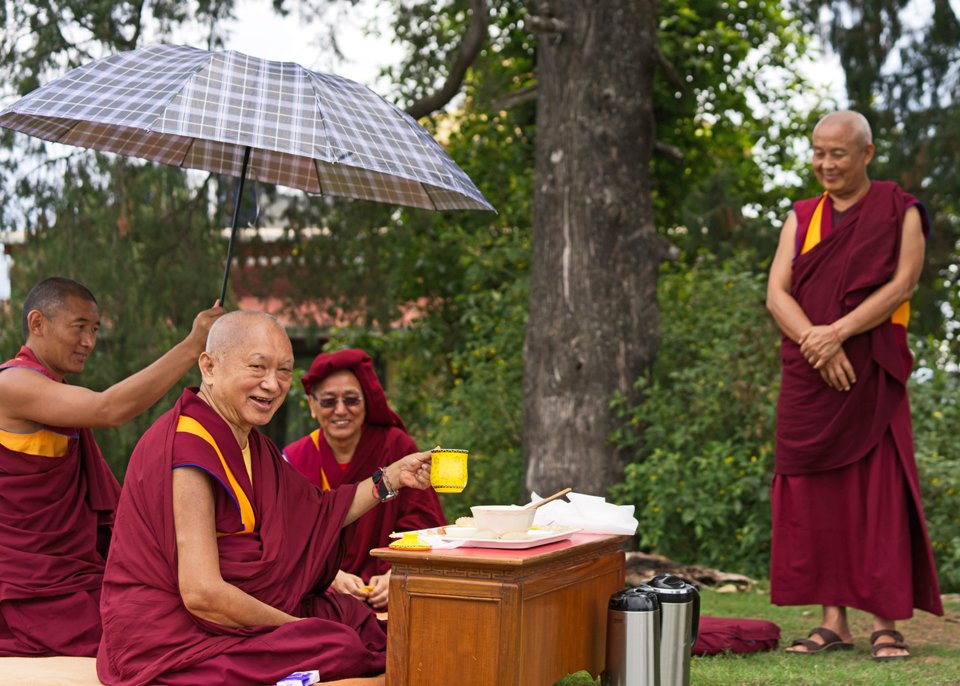
Lama Zopa Rinpoche with Khen Rinpoche Geshe Chonyi, Ven. Tenpa Chodon, and Ven. Sangpo Sherpa on top of Kopan Hill, Kopan Monastery, Nepal, June 2020. Photo by Ven. Lobsang Sherab.
During the coronavirus pandemic, Lama Zopa Rinpoche has been staying at Kopan Monastery in Nepal. Now you can see more than seventy photos of day to day life at Kopan under lockdown in a new photo album spanning March through June 2020. In addition to photos of Rinpoche, we’ve collected photos of Kopan monks and staff as they do some of their daily activities.
We’ve also added albums from Rinpoche’s visits to India between December 2019 and February 2020, and Rinpoche’s short visit to Kopan Monastery in January 2020 for a long life puja.
See more photos of Lama Zopa Rinpoche:
https://fpmt.org/teachers/zopa/gallery/
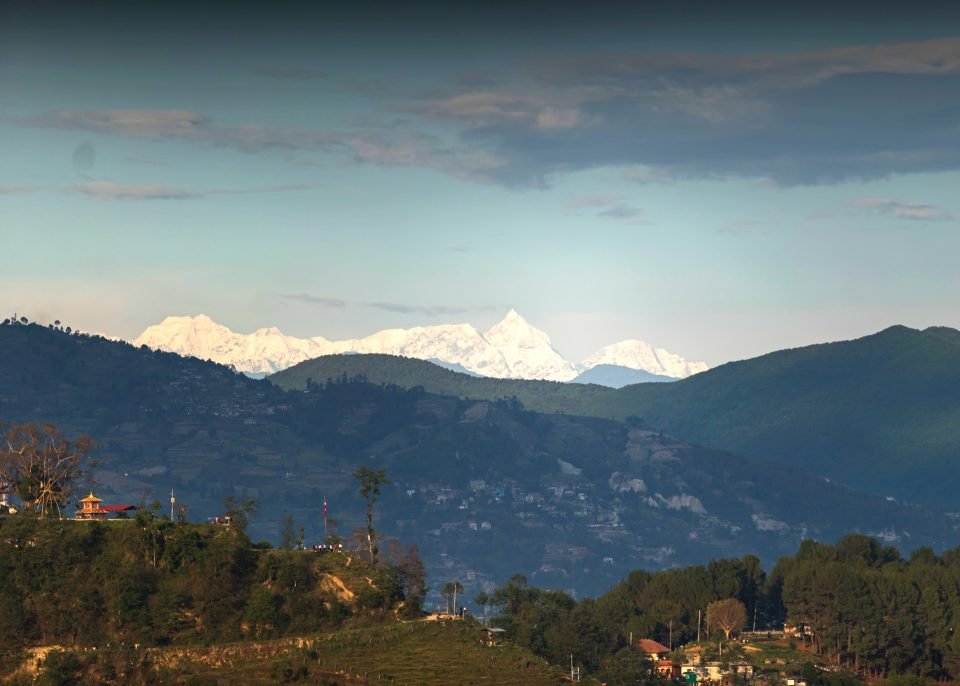
The Himalayan Mountains seen from Kopan Monastery. With the lockdown, pollution in the Kathmandu Valley decreased enough to no longer obscure views of the mountains, Nepal, May 2020. Photo by Ven. Lobsang Sherab.
Watch more from the video series Lama Zopa Rinpoche’s Teachings on Thought Transformation during the Time of COVID-19 and find links to videos in translation, transcripts, MP3s, additional practice advice, and more:
https://fpmt.org/fpmt/announcements/resources-for-coronavirus-pandemic/advice-from-lama-zopa-rinpoche-for-coronavirus/
Practice advice from our teachers, Dharma study-from-home opportunities, and more can be found on the page “Resources for the Coronavirus Pandemic.”
Lama Zopa Rinpoche is the spiritual director of the Foundation for the Preservation of Mahayana Tradition (FPMT), a Tibetan Buddhist organization dedicated to the transmission of the Mahayana Buddhist tradition and values worldwide through teaching, meditation and community service.
- Tagged: photo gallery
15
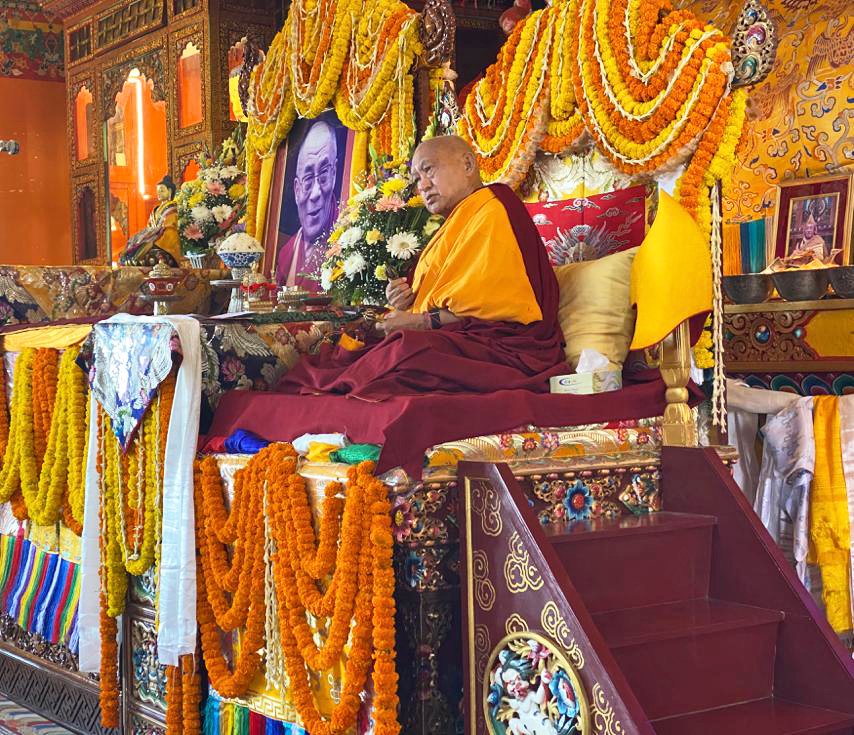
Lama Zopa Rinpoche during the long life puja offered at Kopan Monastery, Nepal, in January 2020. Photo by Ven. Roger Kunsang.
A long life puja was offered to Lama Zopa Rinpoche at Kopan Monastery in Nepal in January 2020. A long-time student composed the following prayer and praise for the puja. Of it, Lama Zopa Rinpoche said, “The long life prayer is telling the false and the truth in our life. … This is because this student understands Dharma and is a good writer.”
Long-life Prayer for Kyabje Thubten Zopa Rinpoche
May the incomparable Spiritual Friend,
Who is more precious than a wish-granting jewel,
Have a long, fruitful life and continue guiding us
Along the path he himself has traveled.
Although you have shown us well that the pleasures of samsara
Are nothing more than suffering in disguise,
Still we remain addicted to these transient pleasures,
Grasping onto them as if they were real—
O Guru, please be patient with short-sighted beings like myself
And continue to reveal the truth behind samsara’s lies
Until all of us come to realize that there is no essence at all
In any of the objects of worldly desire.
Although you have shown us well that, despite appearances,
Nothing exists solely from its own side,
And that the hallucination that it does
Is what traps us perpetually in unsatisfactory existence—
O Guru, please be patient with thick-headed beings like myself
Who return empty-handed from the Jewel Island of Dharma,
Having repeatedly heard the words of the teachings,
But have failed to realize their essential meaning.
Although you have shown us well that cherishing ourselves
More than others is the falsest of friends—
It promises us the fulfilment of our innermost desires,
Yet condemns us to perpetual frustration instead—
O Guru, please be patient with slaves of selfishness like myself
Who fail to learn from your perfect example
That service to others is the only source of true happiness,
The only cure for the miseries of the world.
O Guru, who never tires revealing the path to Full Awakening
To those who, like myself, are addicted to sleep,
Please be patient with all our shortcomings
And remain with us until all beings are free.
COLOPHON: Composed in California by the lay devotee Jhampa Togme on January 22, 2020, to coincide with a long-life puja offered to Kyabje Thubten Zopa Rinpoche at Kopan Monastery, Nepal, by a gathering of his worldwide circle of fortunate disciples. May all our sincere wishes to be continuously cared for by him be fulfilled!
Find more prayers and praises for Lama Zopa Rinpoche on the new page “Long Life Prayers for Lama Zopa Rinpoche Composed by Others”:
https://fpmt.org/teachers/zopa/prayers-by-others/
Watch the video series Lama Zopa Rinpoche’s Teachings on Thought Transformation during the Time of COVID-19 and find links to videos in translation, transcripts, MP3s, additional practice advice, and more:
https://fpmt.org/fpmt/announcements/resources-for-coronavirus-pandemic/advice-from-lama-zopa-rinpoche-for-coronavirus/
Lama Zopa Rinpoche is the spiritual director of the Foundation for the Preservation of Mahayana Tradition (FPMT), a Tibetan Buddhist organization dedicated to the transmission of the Mahayana Buddhist tradition and values worldwide through teaching, meditation and community service.
- Tagged: long life prayers
14
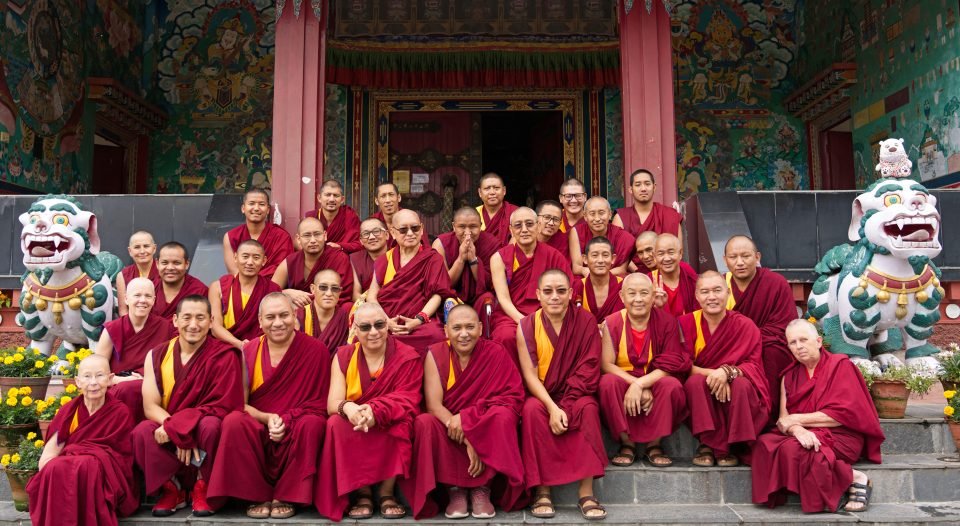
Lama Zopa Rinpoche and Khen Rinpoche Geshe Chonyi with the staff of Kopan Monastery, Nepal, June 2020. Photo by Ven. Lobsang Sherab.
Lama Zopa Rinpoche continues his video teachings on thought transformation from Kopan Monastery in Nepal. Here is a summary of the most recent teaching:
Rinpoche begins this explaining that each Sangha person has been a hero for as long as they have been ordained because they conquer the delusions. Sangha must recognize that they are incredibly brave. Since beginningless rebirths we have been slaves to the delusions. Now as Sangha, you face the delusions. By meeting the Dharma you have found a way to defeat the delusions, which have caused suffering since beginningless rebirths.
You think you are alone in the world, but you never are. There are numberless buddhas and bodhisattvas with you, and they are happy with you. Buddhas and bodhisattvas have a hundred thousand times more compassion for you than you have for yourself.
If you practice good karma, abandon negative karma, and live in the vows this will bring all the success and happiness in life. You have to work at this. You have to abandon the cause of suffering and create the cause of happiness. Dharma practice is to defeat delusions—this is important to and remember.
Attachment to others’ bodies is due to habituation from beginningless samsara. The attachment did not come from the side of the object, but from your mind. Depending on how someone treats you, your mind changes in regard to them. You discriminate based on whether they love and praise you or criticize and not like you. All of that is from your side. Beautiful and ugly come from your mind, not from the side of the object.
Only the person who harms you and gets angry at you gives you the chance to practice the perfection of patience. By practicing patience you can overcome anger and not only achieve liberation from samsara, but you are able to achieve enlightenment with infinite qualities of the holy body, speech, and mind so you can do perfect work for sentient beings. So you can see that this person who is your “enemy” is so unbelievably kind and incredibly precious.
You can go crazy with attachment to people’s bodies because you never think about what is inside: the veins, bones, and flesh. Even outer skin is nothing to be attached to if you look closely at it. In reality, the human body is like a meat shop in India or Nepal, where the bodies are hanging with everything that is on the inside hanging out.
From this, you give up a higher rebirth, nirvana, and enlightenment, and bringing numberless sentient beings to enlightenment for a few seconds of pleasure. You yourself created attachment, therefore freedom from it is in your hands. It is also important to meditate on the suffering of change to overcome attachment. What you call pleasure is labeled by the mind. The negative imprint left on the mental continuum by ignorance projects real pleasure and then real pleasure appears. Then, the wrong concept believing it to be real pleasure causes you to be continuously reborn in samsara. Truly existent pleasure is a total hallucination, like taking drugs and seeing things that aren’t there. Attachment cheats you like honey on the blade of a sword.
We invite you to go deeper into the topics presented here, plus many others, by watching Rinpoche’s video and reading the full transcript of Rinpoche’s teaching.
Watch Lama Zopa Rinpoche’s teaching “Attachment to Pleasure Cheats You“:
https://youtu.be/nQy7JBj1GRM
- Read the transcript of Rinpoche’s teaching
- Dedication verses for COVID-19 Crisis Teachings
Watch more from the video series Lama Zopa Rinpoche’s Teachings on Thought Transformation during the Time of COVID-19 and find links to videos in translation, transcripts, MP3s, additional practice advice, and more:
https://fpmt.org/fpmt/announcements/resources-for-coronavirus-pandemic/advice-from-lama-zopa-rinpoche-for-coronavirus/
Practice advice from our teachers, Dharma study-from-home opportunities, and more can be found on the page “Resources for the Coronavirus Pandemic.”
Lama Zopa Rinpoche is the spiritual director of the Foundation for the Preservation of Mahayana Tradition (FPMT), a Tibetan Buddhist organization dedicated to the transmission of the Mahayana Buddhist tradition and values worldwide through teaching, meditation and community service.
- Tagged: advice from lama zopa rinpoche, coronavirus, covid-19, lama zopa rinpoche thought transformation video teaching, video
11
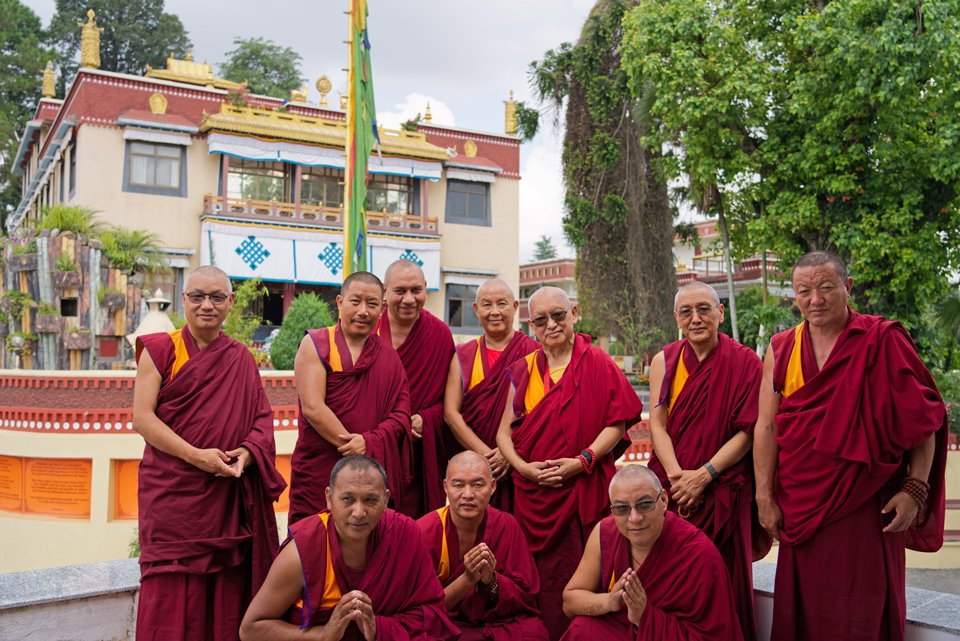
Lama Zopa Rinpoche with the Kopan board members at Kopan Monastery, Nepal, June 2020. Photo by Ven. Lobsang Sherab.
Lama Zopa Rinpoche continues his video teachings on thought transformation from Kopan Monastery in Nepal. Here is a summary of the most recent teaching:
Lama Zopa Rinpoche begins this teaching reminding us that even if we do get the virus, we can utilize it and even enjoy it. If we rely only on the self-cherishing thought, we can’t enjoy it because we see only suffering, the suffering of pain. If we enjoy it, we are experiencing it with bodhichitta—conventional and absolute. With that we can experience the sickness of all sentient beings. We take it on and experience it for them, allowing them to be free from samsara by taking on all of their obscurations and sicknesses so they can achieve enlightenment. This is also a quick way to purify our negative karma, collected since beginningless rebirths, and achieve enlightenment for ourselves.
Even when we are happy, comfortable, and enjoying life, if we remember bodhichitta, then that time can be used as the cause for happiness for sentient beings and doesn’t get wasted. If not done with bodhichitta, our comfort and happiness become wasted. When we are suffering or enjoying life, including when we die, we can remember bodhichitta and utilize whatever we are experiencing on the path to enlightenment for sentient beings. In the West, when death happens suddenly there is so much fear—to separate from family, wealth, one’s body. Even when we are not actively dying from a virus or other factors, there are so many conditions for death that have nothing to do with sickness.
There are roughly 350 ordained Sangha in the FPMT organization. The value of Sangha is more than the whole sky filled with wish-granting jewels. Being Sangha and living in morality is the most important way to achieve liberation from samsara and enlightenment, and benefit sentient beings by freeing them from the lower realms and bringing them to enlightenment. Therefore, if you are a monk or nun you should rejoice all the time! When you think about the preciousness of human rebirth, because you have taken vows, you should rejoice as this is the foundation to achieve everything—to liberate numberless sentient beings from samsara and bring them to enlightenment. You are the real hero.
What brings peace to the world is subduing the mind, subduing delusion. What brings chaos to the world and so many problems is the unsubdued and disturbed mind, delusion. Sangha has the main special job of subduing, overcoming, defeating the enemy: delusion. If you are Sangha you must recognize that you are the real hero doing the most difficult thing to do. Lay people living in vows are heroes as well, but because Sangha have more vows they are the real heroes over the delusions.
We invite you to go deeper into the topics presented here, plus many others, by watching Rinpoche’s video and reading the full transcript of Rinpoche’s teaching.
Watch Lama Zopa Rinpoche’s teaching “Remember Bodhichitta When You Are Dying and the Sangha Are the Real Heroes”:
https://youtu.be/COUPMAUoJP0
Watch more from the video series Lama Zopa Rinpoche’s Teachings on Thought Transformation during the Time of COVID-19 and find links to videos in translation, transcripts, MP3s, additional practice advice, and more:
https://fpmt.org/fpmt/announcements/resources-for-coronavirus-pandemic/advice-from-lama-zopa-rinpoche-for-coronavirus/
Practice advice from our teachers, Dharma study-from-home opportunities, and more can be found on the page “Resources for the Coronavirus Pandemic.”
Lama Zopa Rinpoche is the spiritual director of the Foundation for the Preservation of Mahayana Tradition (FPMT), a Tibetan Buddhist organization dedicated to the transmission of the Mahayana Buddhist tradition and values worldwide through teaching, meditation and community service.
- Home
- News/Media
- Study & Practice
- About FPMT Education Services
- Latest News
- Programs
- New to Buddhism?
- Buddhist Mind Science: Activating Your Potential
- Heart Advice for Death and Dying
- Discovering Buddhism
- Living in the Path
- Exploring Buddhism
- FPMT Basic Program
- FPMT Masters Program
- FPMT In-Depth Meditation Training
- Maitripa College
- Lotsawa Rinchen Zangpo Translator Program
- Universal Education for Compassion & Wisdom
- Online Learning Center
- Prayers & Practice Materials
- Overview of Prayers & Practices
- Full Catalogue of Prayers & Practice Materials
- Explore Popular Topics
- Benefiting Animals
- Chenrezig Resources
- Death & Dying Resources
- Lama Chopa (Guru Puja)
- Lama Zopa Rinpoche: Compendium of Precious Instructions
- Lama Zopa Rinpoche: Life Practice Advice
- Lama Zopa Rinpoche Practice Series
- Lamrim Resources
- Mantras
- Prayer Book Updates
- Purification Practices
- Sutras
- Thought Transformation (Lojong)
- Audio Materials
- Dharma Dates – Tibetan Calendar
- Translation Services
- Publishing Services
- Teachings and Advice
- Find Teachings and Advice
- Lama Zopa Rinpoche Advice Page
- Lama Zopa Rinpoche: Compendium of Precious Instructions
- Lama Zopa Rinpoche Video Teachings
- ༧སྐྱབས་རྗེ་བཟོད་པ་རིན་པོ་ཆེ་མཆོག་ནས་སྩལ་བའི་བཀའ་སློབ་བརྙན་འཕྲིན།
- Podcasts
- Lama Yeshe Wisdom Archive
- Buddhism FAQ
- Dharma for Young People
- Resources on Holy Objects
- Ways to Offer Support
- Centers
- Affiliates Area
- Teachers
- Projects
- Charitable Projects
- Make a Donation
- Applying for Grants
- News about Projects
- Other Projects within FPMT
- Support International Office
- Projects Photo Galleries
- Give Where Most Needed
- FPMT
- Shop
Translate*
*powered by Google TranslateTranslation of pages on fpmt.org is performed by Google Translate, a third party service which FPMT has no control over. The service provides automated computer translations that are only an approximation of the websites' original content. The translations should not be considered exact and only used as a rough guide.Think that everyone you meet is fulfilling all your wishes.







